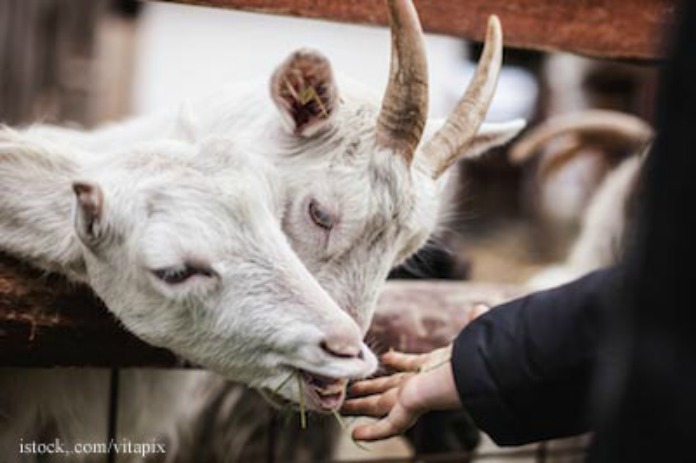Cases of E. coli and Cryptosporidium increased this summer in two counties in Michigan, according to the Health Department. Jennifer Morse, medical director of three regional health departments in that state said in a statement, “These increases are concerning because the resulting illness can be life-threatening. With the investigations that have been completed thus far, the major source seems to be coming from farm animals.” These illnesses occurred in Mecosta and Newaygo counties in Michigan.
 This is important information, since we are approaching the time when many farms open their gates to tourism. Apple picking season is here.
This is important information, since we are approaching the time when many farms open their gates to tourism. Apple picking season is here.
Deadly food poisoning outbreaks linked to farms have increased in the past few years. In fact, in 2013, an E. coli O157:H7 outbreak at Dehn’s Pumpkins in Dayton, Minnesota sickened a child. She developed hemolytic uremic syndrome (HUS) and suffered severe kidney damage. The law firm of Pritzker Hageman won a $7.55 million verdict for her in court. At least seven people were sickened in that outbreak.
Ecotourism on farms is problematic, because animals that live on those farms carry pathogenic bacteria in their intestines. The bacteria are shed in the animals feces. Those feces can get on the animal’s hides, their bedding, railings, gates, and on the ground.
E. coli is ubiquitous in the environment. In fact, this bacteria is one of the most common bacteria on earth. Many kinds of E. coli bacteria are harmless, but some, known as Shiga toxin-producing E. coli, can cause serious illness and death.
Cryptosporidium is a parasite found in animals and humans. This parasite causes watery and explosive diarrhea that can last for months.
Both of these pathogens are spread when a person ingests a tiny bit of feces. This can happen when a child touches a farm animal, then puts her fingers in her mouth or eats a bite of a caramel apple. The Michigan press releases states that, “The local cases this summer point toward the host being farm animals that infected humans that had contact with these animals. There is often an increase of these infections in summer as humans come in more direct and frequent contact with farm animals. This period is when contact between humans and animals is most frequent given seasonal events such as county fairs, petting zoos and farm tours.”
To protect yourself and your family, do not eat or drink in areas where animals are housed. Always wash your hands well with soap and water after interacting with animals, particularly farm animals. If you do choose to go to a petting zoo or farm with your kids, watch them carefully to make sure they don’t put their hands in their mouths when they are around animals.
When you arrive, look around. Farms and exhibitions should look as clean as possible. Animal bedding should be changed frequently. And these facilities should have signage posted to remind visitors to not eat in barns and wash their hands after they leave. If you don’t see evidence of these actions, leave.
Don’t let your child kiss or hug animals. This is difficult, since baby animals are so cute.
Keep sippy cups, small toys, and pacifiers away from your kids when they are around these animals. They should be secured in a backpack or purse. These items often fall on the ground and can become contaminated.
Don’t take baby strollers into animal housing areas. The wheels can become contaminated, and then spread bacteria to your car or back into your home. When you get home, wash all clothing with hot soapy water, and clean the bottoms of shoes and strollers with soapy water.
All of these attractions should have hand washing stations, and those stations should be equipped with clean running water and soap. Use them when you leave the barn or animal area. Wash hands for at least 20 seconds. Alcohol based hand sanitizers are acceptable, but not as effective as soap and water.
It’s important to know that young children are more seriously sickened with pathogens because their immune systems are underdeveloped. The elderly, pregnant women, people with chronic illnesses, and those with compromised immune systems are also more susceptible to food poisoning.
The law firm of Pritzker Hageman helps people sickened at petting zoos, farms, and fairs protect their legal rights, and get compensation and justice. Our lawyers represent patients and the families of children sickened with bacterial infections in personal injury and wrongful death lawsuits against these facilities, along with retailers, food producers, food processors, restaurants, schools, and others. Attorney Fred Pritzker recently won $7.5 million for young client whose kidneys failed because she developed hemolytic uremic syndrome after she contracted an E. coli infection at an apple farm. Class action lawsuits may not be appropriate for outbreak victims because the cases are very unique.




